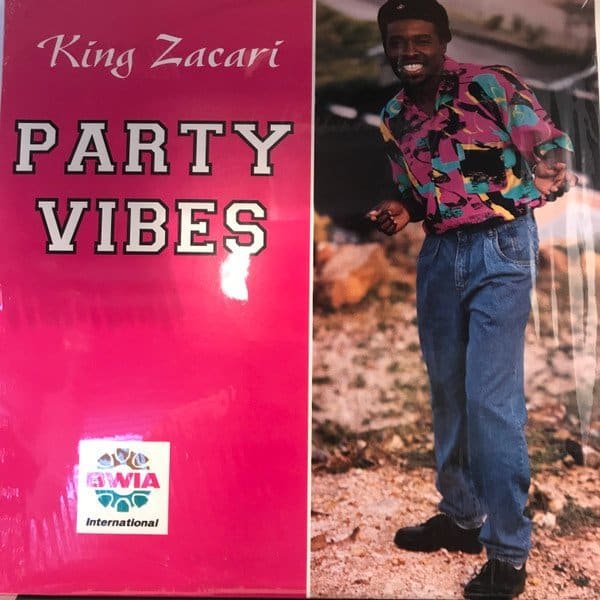December 15th, 1960 – Carl Trevor Myron Sylvester King was born to George and Yvette King (knowed in the community as Mamin) of St. John’s Street in the Point. Having lived in the community for all his life, he considers himself a ‘full fledged, full grown Point man’.
His favourite pastimes as a young child included going to the community beaches with his mother who was fond of swimming. These beaches included ‘Wash Hand Basin’ which was located where the Deep Water Harbour stands today and Dredge Bay.
He also enjoyed watching boxing matches each Boxing Day (December 26th) in Point at Baker’s Corner; a tradition which still continues today. He would particularly look forward to watching his mother, who was a talented boxer, engage in competition with anyone who would challenge her.
His family attended the Spring Gardens Moravian Church and he recalls having to attend Sunday School twice on a Sunday just to be able to receive his twenty-five cents to go see movies at Deluxe Cinema.
King began his formal education at Ms Keaton’s Baby School on Bishopgate Street before moving on to the Moravian Preschool and then, the Villa Primary School. Following this, he humorously indicates that he ‘graduated to the university of the streets’ while visiting a few secondary schools occasionally when they were having fetes.
Though more popularly known for his exploits in the calypso arena, King is an Auto Body Technician by profession. Having always wanted to work for himself, he went under the tutelage of the late Jezreel Meade and Alfred Shaw to learn the basics of the trade. Understudying both men paved the way for him to set up a workshop in his home community. He subsequently was responsible for passing the knowledge on to younger persons, some of whom have since gone into their own enterprise or work along with others.
King’s interest in calypso was sparked from attending a calypso tent at Kensington Court, which was located on St. Mary’s Street just above ACB Caribbean, in 1989. The tent organisers had brought Black Stalin of Trinidad as a guest artiste and he performed quite a number of black conscious songs which piqued the interest of the young King. King went home feeling so inspired and confident in his own ability to write a song and write he did.
His very first composition, ‘When the Zulu Rise Again’, was performed by a Junior calypsonian Pepper-seed since, initially, he had no intention of engaging in actual stage performance. Pepper-seed placed second in the 1989 competition and this motivated King to immediately work on another piece which he dubbed ‘Guilty of Being Black’. Through a collaborative effort with other individuals, he was able to complete recording the song in his workshop, which would become the birthplace of many of his hits. This would be one of the songs that would ultimately launch his stage career. The song was given to a fellow calypsonian, Redding, to perform in the 1990 competition but that never materialised. In light of this setback, the following year, he created the song, ‘Jail Them’ and offered it to the Junior Calypsonian who had rendered his first song, however, this too was not a possibility. It was at this point that he was encouraged by those around him to go and perform.
During the Carnival of 1991, after much rejection and naysaying, King summoned the courage necessary to prepare for stage performance. He recalls himself as being so unprepared for this turn of events that he did not even have a stage name to begin with. It was arranger and calypsonian, Julian “Zebeda’ Laurent who suggested the name Zacari and everything took off from there. He made his entry into the world of stage performance at Swallow’s Pepperpot Calypso Tent where he was backed by Expressions Brass which featured musicians such as late brothers William and Ashby Lewis among others, with ‘Jail Them’. Though he was quite nervous about performing, seasoned calypsonians such as Jabu Star and Shanty were very helpful in encouraging and guiding him and soon enough he became so confident in his delivery that he was being called back to the stage for encore renditions.
Realising that he would need a second song if he were to make it past the elimination stage, King tried to get the lone copy of the unperformed song ‘Guilty of Being Black’ from Redding without success as it could not be found. Refusing to accept defeat, King recalled from memory what he could of the song while engaging the services of the late Little Man Pelle to pen a second verse. With his two renditions now in hand, King not only passed the elimination but won the calypso crown that year.

His success and motivation was quite contagious as it encouraged those closest to him into the artform. 
King credits calypso for the positive changes he has seen in his demeanour over the years. He describes himself as being erratic and flighty in his younger days, however, since becoming involved in the artform, he has been guided towards more conscious decision making. He views himself as a representative of the people and therefore considers it a social responsibility to carry himself in an exemplary manner in the public eye.
His annual renditions mirror this by focusing a lot on the various plights of the people through social commentary. It was for this reason that he launched a calypso tent under the name Zacari’s Cream of the Crop at his workshop in 1997 where calypsonians would be able to sing freely without fear of external interference. The tent ran successfully for a number of years. King shared that the tent eventually closed due to policy changes including the matter of subsidy by the Carnival Development Committee (CDC) with regards to the operation of calypso tents.
Even with the existence of competition within the artform, King places high value on the level of camaraderie that he has experienced within the calypso fraternity over the years. Though he is usually the one to write his own songs, there have been occasions where he has been given songs and ideas for perfecting his craft from other members. He views the experience as a rewarding one and vows continued participation in order to maintain the presence of freedom of expression within the artform which he indicates the criteria and powers that be seek to muzzle. His advice to up and coming calypsonians is, ‘represent the people; not political party. Be yourself. Don’t be afraid’.
Carl Trevor Myron Sylvester ‘King Zacari’ King – Point Man, auto body technician, song writer, calypsonian, musician, community activist, community icon, steel pan player, footballer, cricketer, Justice of the Peace…………


